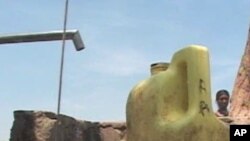The Zimbabwe National Water Authority or ZINWA has begun a national exercise to register boreholes throughout the country as the water crisis continues to affect many in the cities.
Under new rules, the water ministry now requires all borehole owners, including companies, drillers and water bottling companies to have them registered.
Those who want to sink boreholes, companies and individuals alike, will have to apply to get a license from the ministry.
Officials say the exercise is meant to effectively monitor and manage the country’s underground water, among other issues. All boreholes are to be registered by the end of June, officials say.
Most communities in Zimbabwe rely on borehole water as the government and city authorities have failed to provide adequate, taped, clean water to residents.
Water Resources Minister Samuel Sipepa Nkomo told VOA the registration will greatly benefit communities.
"We need to know in various geographical areas how much water we have, we can tell by the borehole which is drilled," said Nkomo.
"It will also assist us in making sure that boreholes are not to close to each other and actually making sure people don't drill in where we believe as the ministry there is contamination."
Meanwhile, business nearly ground to a halt in Harare’s central business district following increased water rationing by the city council late last week due to a burst water pump that left the capital dry.
Harare city council deputy mayor Emmanuel Chiroto confirmed the intensified water cuts but said council had managed to repair the burst water pipe.
Chiroto told VOA Harare does not have adequate resources to update some of its aging equipment, which is constantly breaking down.
But residents blame the council for the worsening water crisis in Harare. Resident Garikayi Mahlengwe said water supply in Hatcliffe where he lives has been erratic for the most part.
"The city is still billing residents even where it is failing to provide services," said Mahlengwe.
He said residents fear the return of water borne diseases like typhoid and cholera due to the non availability of a constant supply of safe drinking water.
Both the water borne diseases which affected thousands of people with the 2008 cholera outbreak and a more recent typhoid outbreak earlier this year, where attributed to lack of accessible and clean water.





